

Technology Implementation in Schools: Key Factors to Consider. New technologies have changed teaching and learning in a number of ways—from graphing calculators to online lesson plans to virtual field trips and simulated dissections, educational technologies can help students access content in new and often exciting ways.
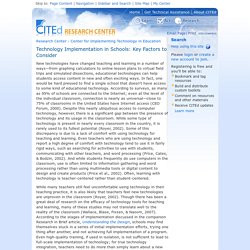
In fact, one would be hard pressed to find a single school that doesn’t have access to some kind of educational technology. According to surveys, as many as 95% of schools are connected to the Internet; even at the level of the individual classroom, connection is nearly as universal—close to 75% of classrooms in the United States have Internet access (CEO Forum, 2000). Despite this nearly ubiquitous access to computer technology, however, there is a significant gap between the presence of technology and its usage in the classroom. While some type of technology is present in nearly every classroom in the country, it is rarely used to its fullest potential (Royer, 2002).
Professional Development Leadership. Teaching Strategies, LLC - Early Childhood Curriculum, Assessment, and Training for Educators. Educational Leadership:Teaching for the 21st Century:21st Century Skills: The Challenges Ahead. Andrew J.
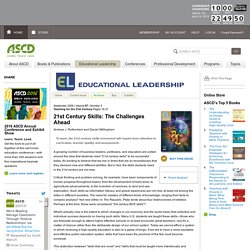
Rotherham and Daniel Willingham A growing number of business leaders, politicians, and educators are united around the idea that students need "21st century skills" to be successful today. It's exciting to believe that we live in times that are so revolutionary that they demand new and different abilities. But in fact, the skills students need in the 21st century are not new.
Critical thinking and problem solving, for example, have been components of human progress throughout history, from the development of early tools, to agricultural advancements, to the invention of vaccines, to land and sea exploration. What's actually new is the extent to which changes in our economy and the world mean that collective and individual success depends on having such skills.
This distinction between "skills that are novel" and "skills that must be taught more intentionally and effectively" ought to lead policymakers to different education reforms than those they are now considering. 21st-Century Teacher Education. For almost as long as there have been institutions dedicated to the preparation of new teachers, the endeavor has come in for criticism.
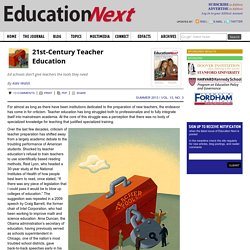
Teacher education has long struggled both to professionalize and to fully integrate itself into mainstream academia. At the core of this struggle was a perception that there was no body of specialized knowledge for teaching that justified specialized training. Over the last few decades, criticism of teacher preparation has shifted away from a largely academic debate to the troubling performance of American students. Shocked by teacher education’s refusal to train teachers to use scientifically based reading methods, Reid Lyon, who headed a 30-year study at the National Institutes of Health of how people best learn to read, once stated, “If there was any piece of legislation that I could pass it would be to blow up colleges of education.”
An occasional insider has joined the fray. The Perspective of Teacher Educators Far beyond Semantics • Early reading. Association of American Educators. First Book. United Federation of Teachers. Here are some resources for teachers looking for help in finding money to pay for classroom projects.
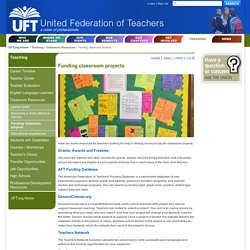
Grants, Awards and Freebies We scour the Internet and other sources for grants, awards and free things that New York City public school educators are eligible for and publish what we find in each issue of the New York Teacher. AFT Funding Database The American Federation of Teachers' Funding Database is a searchable database of loan forgiveness programs, teacher grants and awards, classroom donation programs, and summer studies and exchange programs. You can search by funding type, grade level, position, district type, subject area and state.
DonorsChoose.org DonorsChoose.org is a nonprofit that connects public school teachers with people who want to support classroom learning. Teachers Network The Teachers Network furnishes valuable tips about how to write successful grant proposals and where to find funding opportunities for your classroom. The Foundation Center Free Management Libraries. Using Twitter for Professional Development. The term “professional development” conjures up thoughts of travel, conference fees, arranging substitutes, and loss of precious instructional time.
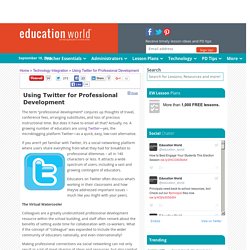
But does it have to entail all that? Actually, no. A growing number of educators are using Twitter—yes, the microblogging platform Twitter—as a quick, easy, low-cost alternative. If you aren’t yet familiar with Twitter, it’s a social networking platform where users share everything from what they had for breakfast to professional dilemmas – all in 140 characters or less. Educators on Twitter often discuss what’s working in their classrooms and how they’ve addressed important issues – much like you might with your peers. The Virtual Watercooler Colleagues are a greatly underutilized professional development resource within the school building, and staff often remark about the benefits of setting aside time for collaboration with co-workers. Hesitant to get started? Experts Say… Getting Started.
Blackboard Learn.